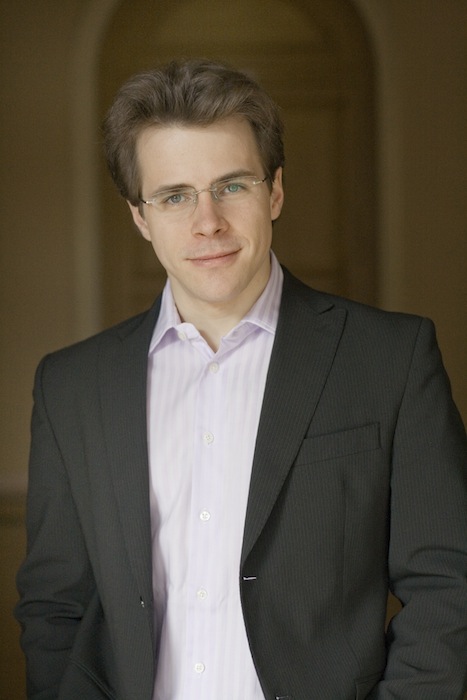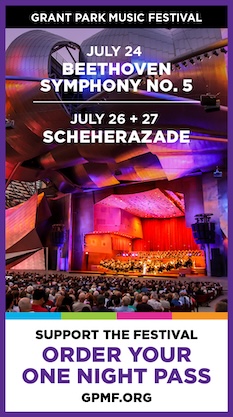Bohemian rhapsody: Jakub Hrůša makes superb CSO debut with a brilliant “Má vlast”

The last time the Chicago Symphony Orchestra performed Bedrich Smetana’s complete Má vlast downtown, Ronald Reagan was in the third year of his presidency, “Every Breath You Take” by The Police was the year’s top song, and Gandhi won the Academy Award as Best Picture.
In other words, it’s been awhile. Rafael Kubelik led those 1983 performances of a work especially close to the celebrated Czech conductor’s heart. In his short term as CSO music director, Kubelik recorded Má vlast with the orchestra and, even in mono, that 1952 Mercury recording remains a touchstone.
Thursday night it was the turn of Jakub Hrůša, a Czech conductor from a new generation. And making a notable CSO debut, Hrůša directed a performance of this national epic that proved a highlight of this music season—idiomatic, exciting and richly characterized, worthy to stand in the Kubelik/CSO tradition.
Hrůša is clearly a young maestro on the rise. Former music director of the PKF-Prague Philharmonic, the 35-year-old currently serves as chief conductor of the Bamberg Symphony and principal guest conductor of the Tokyo Metropolitan Symphony; this fall he becomes principal guest conductor of London’s Philharmonia Orchestra. Somehow he also finds time to serve as president of the International Martinů Circle.
Má vlast (“My home” or “My country”) is a challenge to hold together, running 77 minutes and comprising six separate tone poems, each reflecting different aspects of Smetana’s Bohemian homeland, from mythic and historic to the natural world of castles, rivers and forests. The canvas is epic and the music rich, varied, and imbued with a strong nationalist fervor–not least the concluding sections, in which the patriotic “Hussite” song plays a prominent part. Má vlast remain a singular and extraordinary achievement, especially considering that Smetana was completely deaf by the time he finished the final tone poems.
Thursday’s performance got off to a somewhat dicey start. The two harps opened “Vyšehrad” with the right bardic atmosphere yet the playing became unsettled in the ensuing transition, the musicians perhaps thrown a bit by Hrůša’s flowing baton and sostenuto style. Conductor and players soon were on the same page and the playing grew in grip and focus as it continued. The majestic theme of the title ancient castle sounded with bold, brilliant impact while evocative winds delicately painted the more intimate middle section.
The Moldau river flowed with a steady, warm-toned current in “Vltava,” coursing through a luminous moonlit episode and village festivals that were rendered with an amiable rustic touch.
Tall and bespectacled, Hrůša resembles a Classics scholar you might find doing graduate research in the library. Yet he is an engaging and highly animated podium presence, directing the music, minus a score, with energized gestures. He could also give Riccardo Muti a run for his money in the height and frequency of his podium leaps.
Most importantly, he led a performance that brought his compatriot’s music to vivid and compelling life. The vengeful title warrior in “Šárka” was painted with apt fury as she and her female army trick and then slaughter their male opponents. (The insistent malign bassoon was reflective of Hrůša’s balancing and attention to detail.)
“Z českých luhů a hájů” (“From Bohemia’s woods and fields”) is less programmatic but here proved an evocative portrait of the Czech countryside, from the striding main theme to the pastoral interludes, Hrůša marking firm dynamic contrasts.
Perhaps the final tone poems, “Tábor” and “Blaník,” are a bit too similar in style and the material not quite as inspired as the preceding sections. But Hrůša made a strong case–wisely running them together as a single work–and the stern, insistent Hussite theme rounded the performance off in powerful style to a determined and resounding victory.
Considering the scores of empty seats in the hall for this rarely heard work, the applause was long and enthusiastic for the performance and the young conductor. Hrůša generously shared the ovations with individual musicians and sections in an extended curtain call. As usual, the CSO playing was exemplary with the front-desk winds especially characterful in their many solos, notably clarinetist Stephen Williamson, flutist Stefán Ragnar Höskuldsson, and oboist Michael Henoch.
An historic footnote: In an interesting program note CSO archivist Frank Villella points out the Chicago Symphony Orchestra’s long tradition of having Czech musicians among its members—from violinist John Weicher and the three long-serving Hyna siblings (Otto, Edward and Henri) down to brothers Matous and Simon Michal today. That legacy likely accounted, in part, for the idiomatic style and panache in this performance of a work not played by the orchestra in decades.
The program will be repeated 1:30 p.m. Friday and 8 p.m. Saturday. cso.org; 312-294-3000.
Posted in Performances

Posted May 19, 2017 at 3:43 pm by Brad
The CSO should keep an eye on this young conductor. Definitely one of the most memorable concerts I’ve been to this year. Too bad so few were willing to take a chance on this one. I guess Beethoven 5 needs to be on every program.
Posted May 20, 2017 at 11:30 pm by Steve
Fully agree with Brad. We will attend over 25 concerts this season and this was one of the best two or three so far. Hrusa is eminently talented, would love to see him much more at Symphony Center and see how he handles other works.
Posted May 22, 2017 at 6:38 pm by Andy
A beautiful concert. Strings were all especially deft. Kudos to all involved.